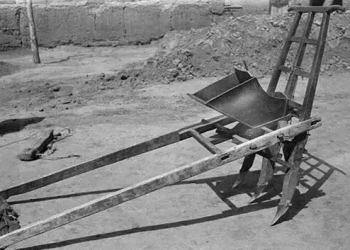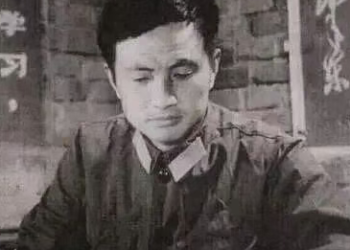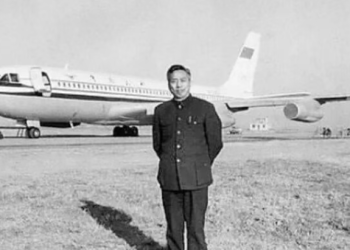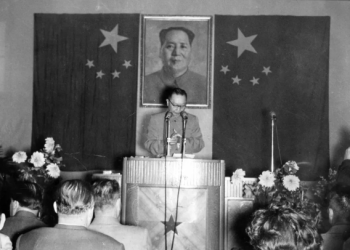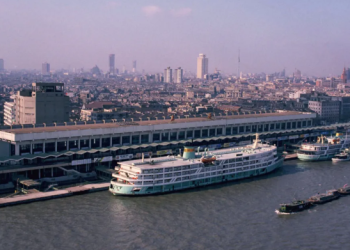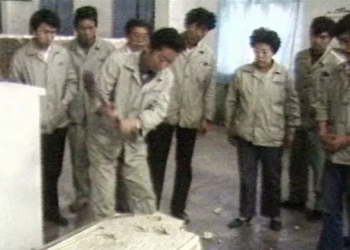Sixty-nine years ago today, Leslie Cheung was born. But he wasn’t always known as Leslie—his birth name was Zhang Fazong, nicknamed “Shi Zai” (meaning “Tenth Child”), because he was the youngest of ten children. His eldest sister, Zhang Luping, was 18 years older than him, while his eighth brother was eight years older. Since his ninth brother passed away on September 12, the family once believed Leslie might be his reincarnation.
As a master tailor in Hong Kong, his father Zhang Huohai crafted haute couture for Hollywood icons like Marlon Brando and earned high respect in the western tailoring business. To manage his factory efficiently, he lived alone beneath the factory in Central, far from his large family. When the six-year-old Leslie was asked about his father, he would answer simply, “I’m not very familiar with him.”
Yet, as an adult, Leslie spoke of his father with gratitude:
“My father’s love for me was unconditional. He’d patiently listen whenever I spoke. My mother was the opposite—her love was always conditional.”
His mother, Pan Yuyao, was one of Zhang Huohai’s two wives. In her youth, she once asked him for household money and was flatly refused. She spent most of her time managing family business affairs and navigating their marriage. Even in later years, when she had become somewhat closer to her children, she still maintained emotional distance—so distant that she’d ask permission even to use a child’s toilet.
Leslie’s childhood confidants were not siblings but a tricycle with a bell and “Sister Six”—a live-in nanny. When guests filled the living room, Sister Six was the only person who noticed young Leslie sitting alone and gently checked in on him.
When Leslie once defended Sister Six after his father scolded her, it created a rift in their relationship. Refusing to back down, Leslie rejected a life allowance from his father and began working odd jobs and selling items on the street to make ends meet.

In 1977, TV station ATV held the “Asia Amateur Singers Competition.” Leslie desperately wanted to enter—but his entire family opposed it, and he lacked the 20 HKD registration fee. On the verge of giving up, he received 20 HKD secretly slipped to him by Sister Six.
Years later, after Leslie had become a star, the first thing he did was invite Sister Six to live with him and care for his family. As his finances improved, he even bought her a home and employed a full-time maid. Leslie always put others first, carrying his struggles silently while keeping a gentle heart for those around him.

Leslie wasn’t a star from the start. Early in his entertainment career, he was criticized for his weak vocal tone and tight high notes. At his first public performance, he threw a hat into the audience to lighten the mood, but someone cruelly threw it back:
“You sing that badly—who do you think you are? Go home and rest!”
Even the nightclub owner said, “Maybe this isn’t your calling.” Leslie fled backstage, crying. Then he declared:
“No one can push me off this stage unless I leave with honor. If you don’t want to listen now, I’ll sing until you do.”
It was a vow no one heard—but he kept it. For four or five years, he imitated singers from a tape recorder every day, refining his pronunciation and style until he formed the unique “Leslie singing style”: gentle and breathy, a subtle tremor—emotion woven into every syllable, like smoke drifting softly yet lingering long in the listener’s soul.
To express his heart fully, Leslie even insisted on creating his own music—often painstakingly storing melodies in his mind before ever writing them down.
Over two decades, he produced over 300 songs. Through sheer perseverance and creativity, he rose to become Hong Kong’s top superstar and an inspirational figure for Hong Kong people. Many used to say, “Even Leslie Cheung took ten hard years.”
Leslie’s artistry extended beyond singing—his dedication to acting was extraordinary. While filming Farewell My Concubine, he spent half a year training in Peking Opera. Even with a 38.9°C fever, he continued stretching. During filming, he had to perform in the heavy Phoenix headpiece and vomited repeatedly. To spare the makeup artists constant touch-ups, he avoided drinking water for days.
Director Chen Kaige recalls a night scene outside the Forbidden City:
Leslie had one shot, appearing in a rickshaw as a Japanese officer thrust his saber aside. After shooting, Leslie sat motionless, tears flowing. Chen didn’t console him—he simply turned off the lights and let him sit in the dark. “At that moment I realized, Leslie had poured so much of his own emotions into the role that he reached that level of performance.”
Leslie’s approach to acting was immersive: “Train in the morning, shoot in the afternoon, return to practice in the evening; rehearsing blocking while eating, walking back-and-forth like he lived onstage.” His persistence was summed up in a phrase: “Without madness, there is no creation.” The result was the unforgettable portrayal of Cheng Dieyi—a character defined not by words but by the lingering echo in a single glance.

Even as his career soared, Leslie remained modest about personal accolades. At his farewell concert at Hong Kong’s Hung Hom Coliseum, he posed a simple question to his audience:“Will you soon forget me? I don’t ask for much. Just remember me if you’re naming singers who represented 1980s Hong Kong—that’s enough.”
Leslie, you’re always remembered—because you never forgot anyone.He once said he disliked being called “Leslie” or “Zhang Guorong.” He preferred “Gor Gor” , a term of warmth. So “Gor Gor” became his affectionate nickname—and he fulfilled that role by caring for everyone.
In an entertainment world where few veterans supported newcomers, Leslie consistently used his platform to help others. He mentioned unknown artists like Louis Koo and Leo Ku in radio interviews, helping bring them media visibility and stardom.
He even hinted publicly that Dicky Cheung was his cousin to boost his profile, regularly shared scenes with choreographer Donnie Yen to give him exposure, and made sure Wang Jie got photo opportunities.
During his 20-show run at the Hong Kong Coliseum, Leslie invited rising artists on stage as special guests, he personally wrote songs for newcomers and cast them in musical productions. His subtle introductions helped stars like Karen Mok, Vivian Chow, Cecilia Cheung, and Charlie Yeung rise. That unassuming generosity—like soft rain nurturing seeds—reflects Leslie’s kindness.
In fan letters, Leslie praised the band Beyond—calling them talented and confident in their bright futures.His compassion wasn’t reserved for insiders; it extended to strangers. Once during an interview, a rookie reporter nervously asked:“Would you die for love?”

Her words caused the audience to laugh, and she blushed. After the interview, she cried softly alone. Suddenly, someone tapped her shoulder and said:“Don’t mind their laughter—you asked the best question tonight.”
That someone was Leslie Cheung—and the reporter said the moment saved her career.Another story: a despondent young man was crying on a roadside at midnight. A gentle voice asked:“Is there anything I can do to help?”
He flailed irritably at first. But the man stayed quietly beside him, talking gently until dawn. Only later did the young man realize it had been Leslie Cheung, the superstar, who had sat with him through the night.Leslie’s care extended even deeper:After a concert tour, he’d gift every backstage staff member a keepsake—and remembered all their names.When a crew member was suffering domestic abuse, he revealed it at a crucial off-time to ensure it drew everyone’s attention.He once relieved an exhausted Australian driver at the airport, driving himself so the driver could rest a bit.
Anita Mui said:“Leslie had a heart of gold. In our twenty-year friendship, he listened when I was troubled, consoled me, protected me—when events were chaotic, he shielded me.”
The world saw only Leslie’s brilliance but not the weight he carried silently. He was endlessly kind to others, but harshly demanding of himself. Never one to lash out, he absorbed dishonor alone until it became unbearable. Unfortunately, his struggles grew deeper than success.

Leslie suffered from severe clinical depression—a physiological illness beyond his control. As his illness progressed, he lost control over his emotions and actions. Yet even during his darkest days, he continued protecting others in his own way:When Anita Mui became embroiled in a paparazzi scandal (“the kidnapping rumor”), Leslie—frail and ill—joined a protest, forcing the offending media to withdraw indefinitely.At Anita’s 20th anniversary concert, he summoned his strength to sing her final two duets personally.When Stephen Chow won the Best Young Director Award at the 21st Hong Kong Film Awards, Leslie—propelled by medication—appeared to congratulate him and wish him well.Leslie desperately wanted to recover. He stuck to treatments and consultations, but his selfless heart ultimately couldn’t endure the pain.
At his farewell concert in 1990 he offered a quiet smile:“Tonight, so many people love me.”
Leslie was loved—and he became someone many carry in their hearts with sorrow.In the film Days of Being Wild, a line hauntingly resonates:“Do you know there’s a bird without feet? It can only fly all its life—only landing once, when it dies.”

On April 1, 2003, at precisely 6:43 PM, Leslie died from the 24th floor of the Mandarin Oriental Hotel. Five minutes before, he told his manager over the phone:“Be at the main entrance in five minutes. I’ll be there.”
And he came—exactly as he said. His manager, Sumfun Chan, kept perfectly professional even at the tragic scene, ensuring no graphic photos leaked. She preserved the pristine image Leslie dedicated his life to maintaining.
Hong Kong fell silent. Thousands braved the SARS outbreak to convene in mourning. Even CCTV broke convention with a 30-minute special about an artist’s passing.

Grieving, people wondered: Why would this talented, wealthy, adored superstar choose to take his own life?
Leslie himself was bewildered by his fate. In his suicide note appeared:“I’ve never done anything bad in my life. Why this?”

Leslie did so much good. As his eldest sister, Zhang Luping, once said:“There’s nothing bad anyone can say about him.”
No one ever criticized him—perhaps because he bore all his pain himself. The more fame one has, the more criticism one faces. Leslie could have retaliated—but he chose to absorb it silently, not burdening others even with his suffering.
Debates over his singing or acting aside, his love for Tony Tang was enough on its own to bring him condemnation in those conservative times. As a public figure, the pressure he bore was unimaginable.
He once said:“Over the past few years, so many people hurt me—hurting me, my family, and my loved ones. I may be an artist, but I’m also a human. Facing such harm, I have no choice but to deal with it.”
Leslie’s way of dealing? Becoming better, more refined—silencing his critics through excellence. But little brother, did you know that this world is imperfect—and that you were still human. For a mortal to live perfectly in an imperfect world—that’s a burden too heavy for any heart to carry.
Now you’ve gone… I wonder if life is easier in another world. Since you left, every April Fools’ Day comes with a pang of sorrow—and a wish: if you were still here, perhaps the day would hold more warmth than pain.
The wind still blows, life moves on.
If you hadn’t left, would you be a mentor on The Voice of China? Would you appear on Happy Camp? If you were still alive, your concerts would still sell out, your films still gather awards, your social media followings would be in the millions, you might even be a fixture on Spring Festival Gala…
The wind continues; yet you remain absent.If you were still here, you’d be an elegant, charming elder; if you were here, would your temples have turned gray, your posture softened? Would you still love lilies?
Autumn would be beautiful—with you around.Today is your 63rd birthday. If you were still with us, this autumn would be brighter.You’re alive in our longing. You’re alive in every spring, summer, autumn, winter.

